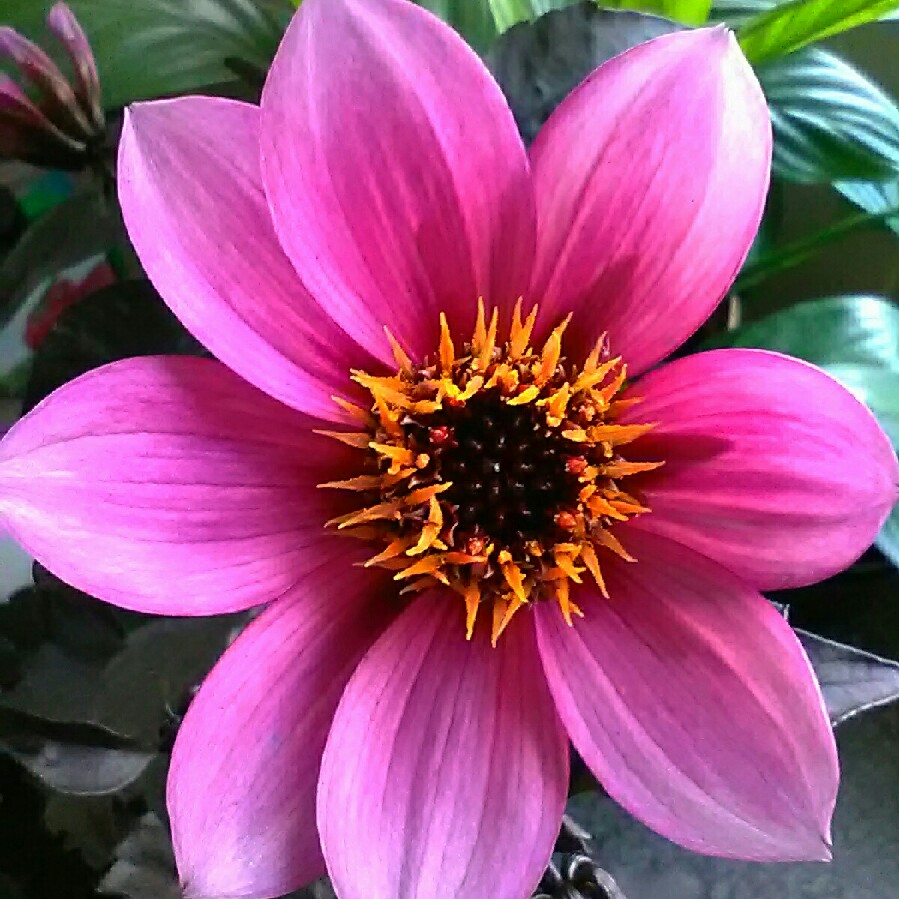
Dahlia 'Hdpu165' (Happy Days Series) syn. Dahlia 'Happy Days Purple'
Dahlia 'Happy Days Purple' (Bedding)
The bedding dahlia is an annual and is easiest to grow as new plants are often raised from seed and it requires little attention after planting out. Always dig in organic matter before planting out and dead head regularly to prolong the flowering. Dahlias are thirsty and hungry plants. Water in dry weather and occasionally feed with liquid fertiliser. A well drained fertile soil is needed as is a sunny spot. Happy Days Dahlias are a new range of dwarf Dahlias producing an masses of colourful flower that contrasts with the bronze/green coloured foliage. They are ideal for growing at the front of a border as they only grow to around 30-40cm, as well as being ideal for pots and containers. 'Happy Days Purple' has single purple flowers with a darker zone in the center.
-
Full sun
-
Frequent watering
-
Not Frost hardy
-
Rich and free draining
Common name
Dahlia 'Happy Days Purple' (Bedding)
Latin name
Dahlia 'Hdpu165' (Happy Days Series) syn. Dahlia 'Happy Days Purple'
type
Annual
family
Asteraceae
ph
5.0 - 7.0 Acid - Neutral
Plant & bloom calendar
-
Best time to plant
-
When the plant will bloom
full grown dimensions
 0.30 M
0.30 M
0.30 M
0.30 M
Dahlia 'Hdpu165' (Happy Days Series) syn. Dahlia 'Happy Days Purple'
The bedding dahlia is an annual and is easiest to grow as new plants are often raised from seed and it requires little attention after planting out. Always dig in organic matter before planting out and dead head regularly to prolong the flowering. Dahlias are thirsty and hungry plants. Water in dry weather and occasionally feed with liquid fertiliser. A well drained fertile soil is needed as is a sunny spot. Happy Days Dahlias are a new range of dwarf Dahlias producing an masses of colourful flower that contrasts with the bronze/green coloured foliage. They are ideal for growing at the front of a border as they only grow to around 30-40cm, as well as being ideal for pots and containers. 'Happy Days Purple' has single purple flowers with a darker zone in the center.
Flowering Season
From Mid Summer TO Mid Autumn
Bedding dahlia will flower from early mid-summer through to autum or the arrival of the first frost. The season can be prolonged by regular dead heading.
Propogation by seed
From Late Winter TO Early Spring
Sow seeds under glass during late winter in boxes of seed compost. Germinate at a temperature of 16C. Prick off the seedlings when large enough to handle, first into boxes and then into 3 inch pots. Harden the young plants off in a cold frame from early spring onwards then plant out in late spring or when danger of frost is over.
Planting bedding Dahlia
From Mid Spring TO Late Spring
Don’t be in a hurry to plant; dahlias will struggle in cold soil. Ground temperature should reach 60°F. Wait until all danger of spring frost is past before planting. Don’t be in a hurry to plant; dahlias will struggle in cold soil. Ground temperature should reach 60°F. Wait until all danger of spring frost is past before planting.


















